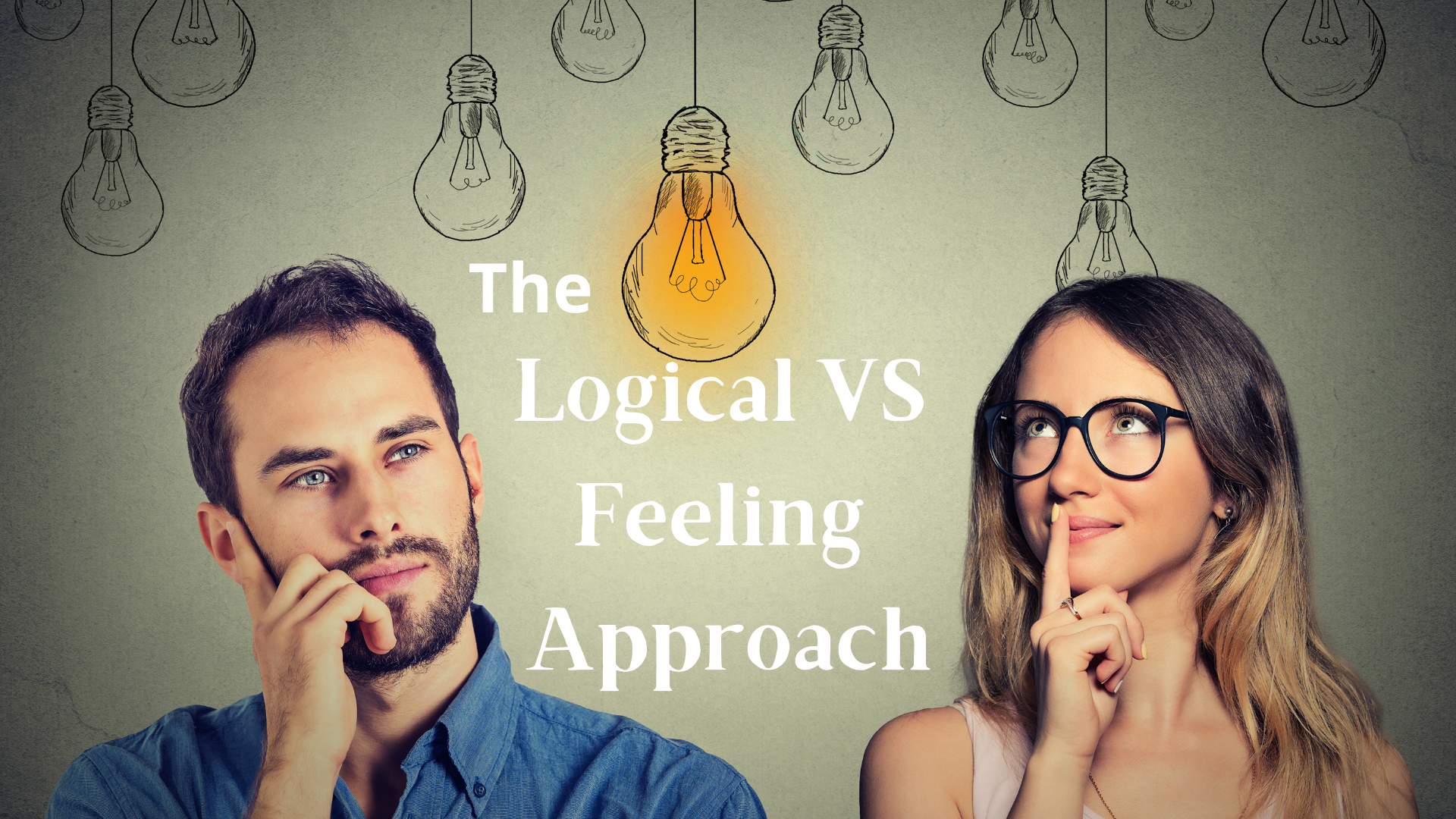 We’re SO different! Have you ever thought that, and been frustrated by it? We have. That’s especially true as it pertains to our logical vs feeling approach to life’s issues. Here’s an example: Steve most often approaches life more logically. I tend to approach life more from the feeling aspect. (Sometimes the reverse is true; but that’s our general approach styles.)
We’re SO different! Have you ever thought that, and been frustrated by it? We have. That’s especially true as it pertains to our logical vs feeling approach to life’s issues. Here’s an example: Steve most often approaches life more logically. I tend to approach life more from the feeling aspect. (Sometimes the reverse is true; but that’s our general approach styles.)
In years past our differing approaches would frustrate us. This is because we couldn’t understand the other’s approach to situations. But through praying, studying marriage, and each other, we’ve learned to make our differences work FOR us rather than against us. In a past Marriage Insight titled, Simple Communication Tools we even share some of the tools that have helped us get to that place of working through our differences more peaceably. The Creative Number Technique can be an especially helpful tool. Check them out to see if you can use any of them.
But on this topic of the logical VS feeling approach, we want to share with you how Jack and Carole Mayhall have worked through their differences on this issue. It may inspire you to better work through your differences. They wrote about this in their book, “Opposites Attack” (no longer being published). We encourage you to see if there’s anything they wrote that could help you in your marriage:
Logical Vs Feeling Approach
JACK:
When Carole and I took the Myers-Briggs Type Indicator, it confirmed what we already knew! We were greatly different! The indicator stated that the difference between a logical approach and a feeling or relational approach represented two ways of evaluating information. The one person functions by deciding things on the basis of logic and objective considerations. This describes me.
I decide things more with my head. I want to know what the “real truth” is about something before I decide. Besides that, I tend to be an onlooker, viewing things from outside the situation. That helps me to take an overall view.
The feeling-oriented person decides on the basis of personal, subjective values. That describes my wife Carole. She most often makes decisions with her heart. She goes by personal convictions and is concerned for relationships and harmony. Carole is almost always a participant within the situation and takes an immediate and personal view. I need Carole’s approach as a balance to my logical, impersonal, objective mode.
Just recently we were invited to two different open houses on a Sunday afternoon. It was the day after we arrived home from an extensive trip. My inclination was to hibernate at home and watch the golf tournament on TV. But we went to the open house for a departing missionary. And then we went to the engagement party for a friend’s daughter. Why? Because I chose to rely on Carole’s sensitivity to people and her perception of the importance of relationships in spite of the way I was feeling.
CAROLE:
I must admit, there have been years of my life when I not only didn’t understand Jack’s way of approaching life in certain instances, I didn’t appreciate it. But the more years we live together, the more I see why God led us together. I’m realizing the ways I need Jack and perhaps why God made many men to be this logical kind of critter.
Not too long ago we were involved in a distressing situation that put my emotional circuits on overload. That same week, we were speaking every morning at a conference. Jack sensed that it was all I could do to keep my emotions under control. On the second day of the conferences, he said to me, “Honey, we’ve got to stay somewhat detached in this situation for the next two weeks. This way we can give ourselves to these conferences.”
Inwardly I thought, “How am I going to do that?” But before I could voice my question, he added, “The next time our friend calls, just say, ‘Let me have you talk to Jack.’ I want to protect you in this.” Gratefully, I responded, “I’ll do that.”
As I was going up the stairs, I thought, “How wonderful it is to have a husband who has greater capacity for this kind of situation than I do. Fortunately, he can be less emotional about it than I. He can stay detached. And he can distance himself.”
Logical vs Feeling: The Distancing Ability
Formerly, I had resented that distancing ability. But now I thought, “It’s great to have someone to depend on who is steadier than I am. It’s great to take responsibility—to ‘hold me back.’ But who does Jack have? He has the Lord, of course. And he can share things with me. But what flesh-and-blood person does he have to whom he can pass the emotional load?” And I answered my own question, “No one!”
Jack, as the head of the family, has no one to pass the buck to. He has the ultimate responsibility. That day it struck me as never before how necessary it is that he isn’t as emotional as I am. If he were, he might “bomb out” at critical points in our life together. I know I would!
Two weeks before this incident, we had talked with a couple who were our exact opposites. He had been a pilot in the U.S. Air Force a couple of years before. And at one point he had been assigned as the escort officer for a friend who had been killed in an air crash. His task was to accompany the body back to the States. He was then to be of help to the widow and her family.
Emotionally Depleted
Dan was a sensitive man. He was very aware of the hurts and needs of those around him. During the week he was with the grieving family. And he became immersed in their situation. Emotionally, he became the husband and father to the widow and her children as well as bereaved friend.
When Dan flew back to be with his family, he collapsed! He was so emotionally depleted he couldn’t relate to his own wife and family. His wife was not only hurt but jealous of his deep involvement with another wife and family.
As we talked with them, we realized that God had given Dan a precious gift. He could identify and empathize. Plus, he could be involved in a way that most men couldn’t. But along with the gift came certain dangers that he needed to guard against with extreme care.
Being Aware of Needs as you Work with the Logical Vs Feeling Approach
There were two in particular. First, he would have to protect his own emotional resources so that giving to other people would not so drain him that he had nothing left for his own wife and children. And he’d have to be cautious that his emotional involvement with others did not lead to emotional entanglements.
Afterward I thought about the times I’d heard wives say, “Oh, my husband doesn’t seem to feel deeply. He can’t relate to my emotions. I wish her were like… [a pastor, counselor, a friend].” I considered the times I’d had to stop my own thoughts from going in that direction. That caused me to go to Jack right then and apologize to him.
Then I had a praise service to a God who created a husband with exactly the characteristics I need. “Thank You, God,” I prayed. “Thank you for giving me a man who can take a detached view of circumstances, of people —yes, of my emotions. He’s one who can help me get perspective. He can take responsibility because he is able to stay cool and levelheaded. Thank You for Jack.”
Working with the Logical VS Feeling Approach
JACK:
It has taken us some time to understand and appreciate the other’s approach to life. We hope it won’t take you as long as it’s taken us. It’s necessary to see how we fit together as logical or feeling persons—to realize that the logical person’s strength comes in analyzing plans. He/she is seeing cause and effect, weighing the consequences and counting the costs of all the options open.
The feeling person, however, examines how deeply people feel about the options. They examine what values are involved, and what the needs are of those involved. Then they can make a fresh appraisal by understanding how in the long run each solution will affect the people involved.
We couldn’t say this any better! That’s why we shared this portion of Jack and Carole’s book. It comes down to the fact that we need to work WITH our differences. We shouldn’t allow our differences to separate us. If we don’t, they will overpower the good within our marriage relationship. God created us different for a reason.
We’re told in Romans 12, “We who are many form one body. And each member belongs to all the others. We have different gifts, according to the grace given us.“
God obviously wants us to work WITH our differences, rather than letting them separate us.
In closing:
Below are 3 short thoughts on working with our differences—whether they involve the logical VS feelings approach, or not:
• “Before embarking on a creative activity with your mate keep in mind the differences between men and women especially in their thinking and perceptions. Even though men and women are alike in many physical capacities, there seems to be a difference in the ‘wiring’ of the two sexes. Therefore, we must be sensitive to the different perspective of each person. What may seem fun to one spouse may be totally boring to the other.” (Rick Bundschuh & Dave Gilbert, from the book, “Dating Your Mate”)
• “If you and your spouse work to become a student of each other and value each other’s differences, God will begin doing an amazing work in you and your marriage. After all, He wants to do ‘exceedingly abundantly above all we ask or think, according to the power that works within us’” (as told to us in Ephesians 3:20). (Dewey Wilson)
• “In God’s mind, our differences are designed to be complementary. They are not to cause conflicts. This principle is illustrated by the church, as the apostle Paul described in 1 Corinthians 12. Each member performs a different role; yet each is seen as an important part of the body. Believers can accomplish far more when we function as a team. Why can’t we get this working in our marriages? It all begins by accepting our differences as an asset rather than a liability.” (Gary Chapman)
May we ALL learn to appreciate the gifts God gave our spouses! And may we use them together to benefit not only our marriages, but other marriages, as well.
Cindy and Steve Wright
— ADDITIONALLY —
To help you further, we give a lot of personal stories, humor, and more practical tips in our book, 7 ESSENTIALS to Grow Your Marriage. We hope you will pick up a copy for yourself. (It’s available both electronically and in print form.) Plus, it can make a great gift for someone else. It gives you the opportunity to help them grow their marriage. And who doesn’t need that? Just click on the linked title or the picture below:
ALSO:
If you are not a subscriber to the Marriage Insights (emailed out weekly)
and you would like to receive them directly, click onto the following:
Filed under: Marriage Insights



(SINGAPORE) I think it can be frustrating, whichever combination a couple is. That is, if a couple has different approach, they have to learn to balance and appreciate each other’s approach. If both are of logical approach, they may have to argue over each other’s logic. Or if they are both of feeling approach, they may end up not getting anything done.
But in general, men tend to have the logical approach while woman tend to have the feeling approach. In the article, Jack had no one "to pass the buck" to, but God. In that sense, he undertakes the responsibility as the "man of the house" who the wife can depend on.
I believe it can be frustrating for wives if their husbands are of the feeling type. When the wives are emotional and depend on the husbands who are equally emotional, they may both end up frustrated.
I’m saying this as I am the feeling type. Having recently been married, I’m on an uphill learning curve to be less feeling and to be more emotionally steady. I need to do that to provide the stability the family (my wife and I) need. Is that the right thing to do? Am I being stereotypical?
(PAKISTAN) It is very good.
(South Africa) Good day to you. I do not know how to thank you for the emails you have been sending me. I am so happy that I am getting back with my wife of seven years in marriage after a year long separation. I kept reading your emails and decided that I am not going to mess up my marriage but I have to work on my marriage. Thank you very much.
(SOUTH AFRICA) I thank God for working a miracle in the lives of Floyd and the family. It is a blessing and should be everyone’s duty to ensure their marriage is kept intact. I have been divorced for 6 years now and it has not been at all easy. Despite many attempts I have made to reconcile with the father to my children aged 10 and younger, he will not accept it. I do not know what else to do but leave it to God. The most painful is that my need and desire to have a man look after us grows more and more as the months and years go by. I desire to be linked to someone who can help me through this period (I have no idea how long it should last). My greatest fear is that despite being a Christian I feel I am getting more and more prone to sin as I no longer know If I can contain with the pressures of single motherhood. Please help me.